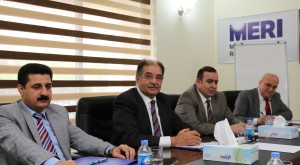On December 8, in an official visit to MERI, Mr. Sinan Chalabi, Minister of Justice, met with MERI’s President to discuss possible ways forward for the justice system in the Kurdistan Region. Minister Chalabi was accompanied by Mrs. Sazgar Ali Naji Attar, Chief of the Prosecution Office, and other members of his Ministerial Council who engaged with MERI’s Democracy & Governance Team in a constructive exchange on current areas of concern.
The meeting was a follow-up to MERI’s recent visit to the Ministry of Justice, where Minister Chalabi expressed his unconditional support for all-encompassing efforts to empower the justice system. In a roundtable setting, the participants discussed priority areas for institutional development and agreed that there is need for urgent action to address the obstacles to the consolidation of democratic structure in the Kurdistan Region.
One of the key obstacles identified was the low quality of the provision of public services. The reasons for the low quality of public services bordered upon the following, including, systemic weaknesses such as inefficiency in bureaucratic procedures, legal loopholes, the lack of performance standards as well as incentives for employees that impeded the justice system from fully exercising its functions. To address this, MERI proposed the development and implementation of a quality-based approach in order to enhance the quality of services provided to citizens by the justice system.
As part of a stabilisation strategy, Good Governance has evolved into a widely recognized international concept that has become synonymous with nation-building. It aims at the transition of post-conflict societies into full-fledged democratic systems. Together with security and economic progress, Good Governance is increasingly becoming a priority area of KRG’s development policy. At MERI, Minister Chalabi reiterated his willingness for a collaborative project on Good Governance in Kurdistan Region’s justice system and emphasised the role of the judiciary in promoting equality and strengthening civil society.
Pursuing the path to Good Governance, however, is a complex and challenging undertaking. It requires tailor-made solutions that incorporate the specific historical and traditional cultural context of a society, such as peculiarities of legal pluralism, where traditional or religious norms and mechanisms co-exist alongside the formal/constitutional legal framework of the state. Minister Chalabi and the President of MERI agreed that although the social context of the Kurdish society should be taken into consideration, there is no acceptable alternative to this path. States must be encouraged to shape their action towards a culture where public institutions serve citizens based on their constitutionally guaranteed rights. They must function based on principles of checks-and-balances, transparency and accountability.
To that end, in collaboration with the Ministry of Justice and the Judicial Council of Kurdistan Region, MERI will launch a new project on ‘Good Governance and the Justice System’ in January 2015. The project will promote measures to ensure efficient and transparent procedures performed in line with ethical standards that are derived from a coherent system of legislation and regulations. The project will provide a pragmatic starting point for the design of public services. The different levels on which this project aims to have an impact are: enhancing quality in bureaucratic procedures through management of leadership, advising on draft legislation in an inclusive process with all stakeholders and implementing an evidence-based policy approach.
* * * * *
About MERI: The Middle East Research Institute is Iraq’s leading policy-research institute and think tank. It is an independent, entirely grant-funded not-for-profit organisation, based in Erbil, Kurdistan Region. Its mission is to contribute to the process of nation-building, state-building and democratisation via engagement, research, analysis and policy debates.
MERI’s main objectives include promoting and developing human rights, good governance, the rule of law and social and economic prosperity. MERI conduct high impact, high quality research (including purpose-based field work) and has published extensively in areas of: human rights, government reform, international politics, national security, ISIS, refugees, IDPs, minority rights (Christians, Yezidis, Turkmen, Shabaks, Sabi mandeans), Baghdad-Erbil relations, Hashd Al-Shabi, Peshmarga, violence against women, civil society. MERI engages policy- and decision-makers, the civil society and general public via publication, focused group discussions and conferences (MERI Forum).


